Diplomatic Bluebook 2021
Chapter 4
Japan Strengthening Its Presence in the International Community
2 Cultural, Sports, and Tourism Diplomacy
(1) Overview
For a very large number of foreign nationals who develop an interest in Japan, Japanese culture is a motive for their interests. MOFA and the JF carry out various projects ranging from introducing Japanese culture and sports to promoting inbound tourism, aimed at creating positive images of Japan abroad, boosting the overall Japanese brand, and encouraging a deeper understanding of Japan, as well as fostering the circle of people with a great affinity toward or knowledge of Japan and increasing the number of foreign visitors to Japan. For example, “Cultural Projects of Diplomatic Missions Overseas” introduce the wide-ranging attractions of Japan, from traditional culture such as tea ceremony, flower arrangement and martial arts, to aspects of modern culture such as anime, manga and fashion and Japanese food culture. As it was difficult to implement programs with guests and participants in 2020 due to the COVID-19 pandemic, the diplomatic missions overseas organized and conducted many programs through online media.
Under the “Japan Brand Program,” MOFA has dispatched experts of various fields overseas to establish a national brand and give Japan a stronger presence in the world. MOFA also holds seminars, workshops and demonstrations to share Japan's outstanding cultural assets, which represent a culmination of Japan's experience and wisdom. In light of the continued difficulty in sending experts overseas due to the spread of COVID-19, MOFA will continue to share Japan's diverse attractions and strengths by incorporating projects using online platforms.
It is also important that Japan takes the opportunity of the TOKYO 2020 Games to further enhance Japan's presence in the field of sports. As part of the “Sport for Tomorrow (SFT)” program, MOFA is engaged in various initiatives such as sports exchanges and sports promotion support projects overseas, dispatching sports instructors through the JICA volunteer program, and the provision of sporting equipment and improvement of sporting facilities through Cultural Grant Assistance. In addition, MOFA provides information about these initiatives in Japan and abroad through MOFA's “MofaJapan x SPORTS” Twitter account. Furthermore, MOFA supports the Host Town Initiative that promotes mutual exchange with the countries and regions participating in the TOKYO 2020 Games.
MOFA conducts a range of activities through Japan's diplomatic missions overseas to promote a deeper understanding of Japan by fostering the circle of the next generation of people with a great affinity toward or knowledge of Japan and encouraging Japanese studies. These include providing information on studying in Japan; building alumni networks comprising foreign nationals who have studied in Japan; cooperating with the JET Program, which invites young foreign nationals to come work for local governments in Japan; holding exchange programs for youth and adults from Asia and the U.S.; and providing support for Japanese studies.
Promoting the Japanese language overseas fosters individuals who engage in exchange with Japan, deepens understanding of Japan, and creates foundations for friendship between Japan and other countries. Japanese language education is becoming increasingly important, as evidenced by the promulgation and entering into force of the Act on Promotion of Japanese Language Education in June 2019, and the formulation of the Basic Policy for the Comprehensive and Effective Implementation of Measures to Promote Japanese Language Education (Cabinet Decision) in June 2020. Through the JF, MOFA dispatches Japanese-language education specialists overseas, conducts training programs for overseas Japanese-language instructors, and develops Japanese-language education materials. To address the labor force shortage in Japan, Japan began accepting foreign workers under the “Specified Skilled Worker” residence status since April 2019. In this connection, MOFA has also been working to meet a new type of need by providing Japanese language education to foreigners interested in coming to Japan for work.
In cooperation with the United Nations Educational, Scientific and Cultural Organization (UNESCO), Japan has been actively engaged in preserving the world's tangible and intangible cultural heritage. Moreover, Japan is actively taking part in the international framework for safeguarding heritage through conventions such as the World Heritage Convention and the Convention for the Safeguarding of the Intangible Cultural Heritage (see (7) on page 320).
By putting creative efforts into promoting such cultural and sports diplomacy during the COVID-19 pandemic, such as through online channels, and by appealing Japan's charms to the world, MOFA helps bring more foreign visitors to Japan.
(2) Cultural Programs
For Japan's diplomatic policies to be smoothly implemented in the international community, it is important to promote a better understanding of Japan among the individual foreign nationals who form the foundation of public opinion and policy making, and to make Japan's image even more positive. Based on this perception, MOFA engages in communicating information about the diverse attractions of Japan through diplomatic missions overseas and the JF. In 2020, the online event “Japan Matsuri Presents” was held as a part of the Japan-UK Season of Culture, with the aim of creating opportunities for people to experience Japanese culture safely even during the COVID-19 pandemic. This event attracted about 30,000 viewers, and communicated the diverse attractions of Japan ranging from traditional culture such as Japanese drumming and martial arts, introduction to Japanese cuisine and Japanese liquor, to popular culture such as dance performance by the Tomioka Dance Club high school students, which is even well known locally.
Diplomatic missions overseas carry out a range of cultural projects as part of efforts to promote a deeper understanding of Japan and expand the circle of people with a knowledge of Japan in the areas under their jurisdiction. For example, they plan and implement events such as workshops on tea ceremony, flower arrangement and origami, as well as Japanese film screenings, Japanese music performances, martial arts demonstrations, traditional craft exhibitions and Japanese speech contests. In recent years, they have also actively introduced Japanese lifestyle and culture including pop culture such as anime and manga, as well as Japan's food culture.
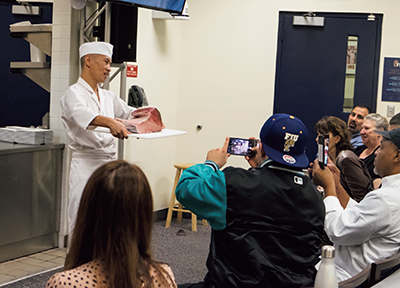 Lecture and demonstration on Japanese cuisine (January 27, Miami, U.S.)
Lecture and demonstration on Japanese cuisine (January 27, Miami, U.S.)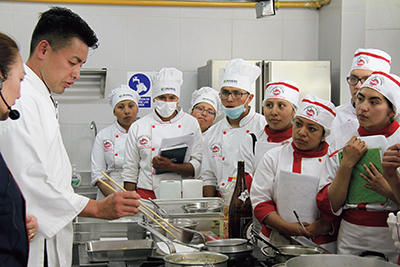 Lecture and demonstration on Japanese cuisine (February 17, La Paz, Bolivia)
Lecture and demonstration on Japanese cuisine (February 17, La Paz, Bolivia)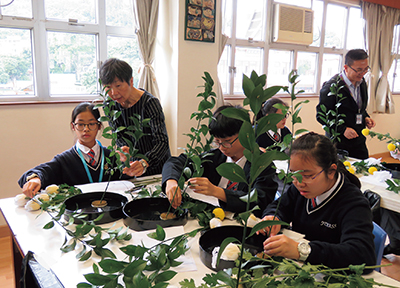 Lecture and demonstration on the Japanese art of flower arrangement (ikebana)(January 6, Hong Kong, China)
Lecture and demonstration on the Japanese art of flower arrangement (ikebana)(January 6, Hong Kong, China)Furthermore, in years that mark diplomatic milestones, MOFA collaborates with governmental and private organizations to intensively carry out large-scale and comprehensive commemorative projects that include mutual visits of dignitaries, various conferences, and public relations and cultural projects with the aim of effectively promoting a deeper understanding of Japan. In 2020, large-scale cultural events were conducted to commemorate the 100th anniversary of the establishment of diplomatic relations between Japan and the Czech Republic and the 50th anniversary of the establishment of diplomatic relations between Japan and Fiji.
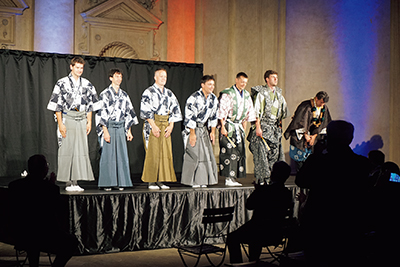 Kyogen performance to commemorate the 100th anniversary of the establishment of diplomatic relations between Japan and the Czech Republic (September 23, Prague, Czech Republic)
Kyogen performance to commemorate the 100th anniversary of the establishment of diplomatic relations between Japan and the Czech Republic (September 23, Prague, Czech Republic)In collaboration with MOFA and diplomatic missions overseas, the JF promotes and provides support for Japanese-language education and Japanese studies, as well as runs arts and cultural exchange projects to promote Japanese culture and arts in a variety of forms throughout the world. In light of the COVID-19 pandemic, emergency support was provided for arts and cultural exchange projects including online projects, and cultural introduction and dialogues were conducted online by the JF headquarters and overseas offices. From November, the JF held the Japanese Film Festival Plus: Online Festival for the first time in ten countries around the world.
Furthermore, the Japan Foundation Asia Center has been steadily implementing the “WA Project: Toward Interactive Asia through Fusion and Harmony” announced by Prime Minister Abe in December 2013. The project steadily implements a wide range of cultural exchange projects with a focus on providing support for Japanese-language education along with interactive arts and cultural exchange projects. The “NIHONGO (Japanese language) Partners” program is one of the main projects to support Japanese-language education in Asia, and a part of pre-dispatch training was provided this year through Ritsumeikan Asia Pacific University (Beppu City, Oita) with the goal of regional revitalization. By the end of FY2019, 2,375 Japanese citizens were dispatched mainly to secondary educational institutions in Ten Southeast Asian countries, China and Taiwan, where in addition to providing Japanese-language support they also engaged in exchange projects that entailed introducing Japanese culture. (Dispatch was suspended in FY2020 due to the COVID-19 pandemic.) These efforts were warmly commended by many people affiliated with the schools in these countries and region, who appreciated the NIHONGO Partners helping motivate students to learn.
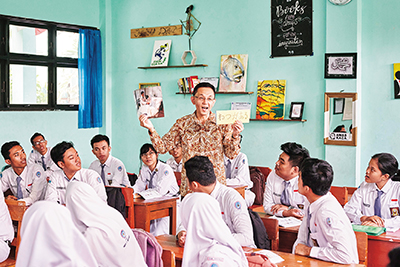 NIHONGO Partners playing an active role at the dispatch destination (February, Indonesia; Photo: Japan Foundation)
NIHONGO Partners playing an active role at the dispatch destination (February, Indonesia; Photo: Japan Foundation)In the two-way arts and cultural exchange program, in light of the COVID-19 pandemic, assistance was provided for joint projects between Japan and other Asian countries that do not involve cross-border movement of people and the online seminar series “Asia Center TERAKOYA” was held, presenting discussions on the potential of international exchanges. The “Asia Lounge” Conversation Series was also held in collaboration with the Tokyo International Film Festival. In this series, dialogues between people in the film industry of Japan and Asia were held in an online format.
The Japan International MANGA Award was launched by MOFA in 2007 with the aim of rewarding manga creators who have contributed to the spread of manga culture overseas and the promotion of international cultural exchanges through manga. The 14th Japan International MANGA Award, held in 2020, received the record-high 383 entries from 61 countries and regions. The Gold Award was given to a work from Taiwan. This year, there were award entries from Mauritania and Montenegro for the first time.
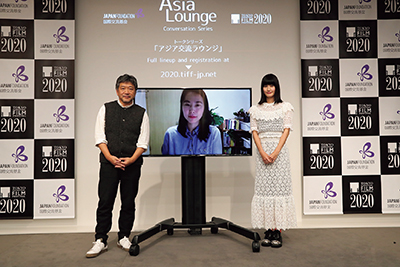 Film directors Hirokazu Koreeda, Bora Kim (the Republic of Korea), and actress Hashimoto Ai, taking the stage at the “Asia Lounge” Conversation Series of the Tokyo International Film Festival (November, Tokyo ©2020 TIFF; Photo: Japan Foundation)
Film directors Hirokazu Koreeda, Bora Kim (the Republic of Korea), and actress Hashimoto Ai, taking the stage at the “Asia Lounge” Conversation Series of the Tokyo International Film Festival (November, Tokyo ©2020 TIFF; Photo: Japan Foundation)(3) People-to-People Exchange and Exchanges in the Area of Education and Sports
To build personal relationships and promote a better understanding of Japan, MOFA carries out a number of projects that invite foreign nationals who have a significant influence on shaping public opinion and the policymaking process and who are expected to play a leading role in various fields. In the area of education and sports, MOFA conducts various activities to promote people-to-people exchanges. These projects not only promote mutual understanding and friendships but also enhance Japan's presence in the international community, which considerably benefits Japan's national diplomatic interests.
A Student Exchange Programs
MOFA actively introduces the attractiveness and opportunities of studying in Japan to foreign students through Japanese diplomatic missions overseas, and implements application and screening procedures to grant the Japanese Government (MEXT) Scholarship to promising students abroad. It also makes efforts to network with former foreign students who have returned to their home countries through Japan Alumni Associations and to foster the circle of people with a great affinity toward or knowledge of Japan. In 2020, some of these activities were held through online methods, depending on the situation in the respective countries.
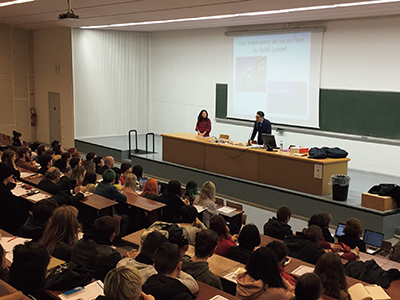 Briefing session on studying in Japan, undertaken by the diplomatic mission overseas (February, France)
Briefing session on studying in Japan, undertaken by the diplomatic mission overseas (February, France)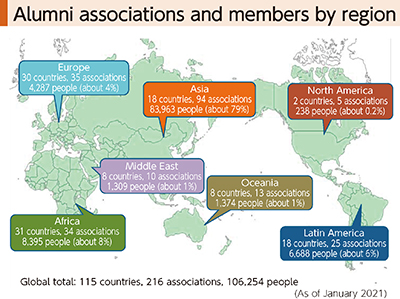
B JET Programme (The Japan Exchange and Teaching Programme)
The JET Programme was launched in 1987 to improve foreign language education in Japan and promote international exchange with Japanese citizens in local areas. To date, 70,000 people have taken part in the program and were dispatched all over Japan. This program is administered by local authorities and other organizations in cooperation with the Ministry of Internal Affairs and Communications (MIC), MOFA, the Ministry of Education, Culture, Sports, Science and Technology (MEXT), and the Council of Local Authorities for International Relations (CLAIR). Through the program, young foreign nationals are invited to Japan and appointed to posts in local governments and schools. MOFA is responsible for the application and screening process, pre-departure orientation, and support for the activities of the JET Alumni Association (JETAA), which operates in 18 countries and has about 24,000 members. JETAA conducts activities to introduce Japan in many countries. Many of those who went through the JET Programme are important human and diplomatic assets for Japan, as they go on to work in a variety of fields around the world as supporters for Japan and experts of Japan. In spite of the impact of the global COVID-19 pandemic in 2020, some of the accepted participants were able to come to Japan after taking the necessary measures.
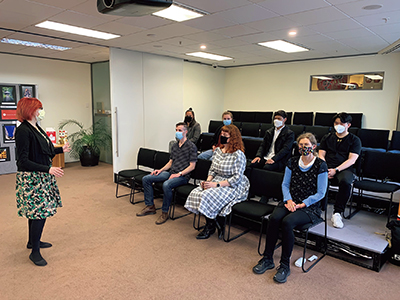 Pre-departure orientation for JET Programme participants, held at the Embassy of Japan in New Zealand (November, New Zealand)
Pre-departure orientation for JET Programme participants, held at the Embassy of Japan in New Zealand (November, New Zealand)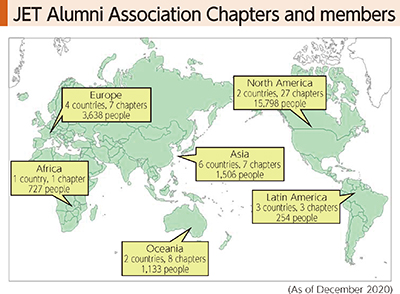
C Sports Exchange
Sports enable communication beyond language and can be an effective tool for promoting friendly relations and a better understanding of Japan. As Japan gains more attention for the TOKYO 2020 Games, since January 2014, the Government of Japan has been implementing the “Sport for Tomorrow (SFT)” program as an international cooperation initiative through sports with the goal of spreading the value of sports to over 10 million people in more than 100 countries by 2020. The program achieved this goal ahead of schedule in September 2019. SFT also includes the “Projects for Sports Diplomacy Enhancement” scheme, a sports exchange program started in FY2015 that includes projects such as dispatching and inviting athletes and instructors, providing equipment and holding sports-related receptions at diplomatic missions overseas. The projects have also contributed to the development of bilateral relations. Due to the impact of the COVID-19 pandemic in 2020 that restricted the global movement of people, exchanges were held through support for the provision of equipment. These SFT programs have contributed to enhancing the presence of those Japanese parties engaged in sports within the international sports community.
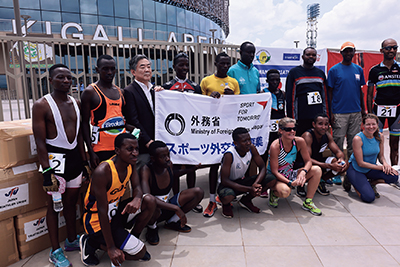 Presentation of triathlon supplies, delivered through the provision of equipment project under the SFT program (February, Rwanda)
Presentation of triathlon supplies, delivered through the provision of equipment project under the SFT program (February, Rwanda)As a Paralympian, I have had the opportunity to visit various countries and interact with people from these countries. I have traveled for competitions and training camps, and also as a speaker or a lecturer at conferences and lectures. An activity that left a particularly deep impression on me was teaching swimming to children with a visual disability in Malaysia in 2006, when I visited the country as a member of the Japan Overseas Cooperation Volunteers under the Japan International Cooperation Agency (JICA). It was an experience that made me realize how sports has the power to transcend cultures, religions, languages, and disabilities. As a part of the “Sport for Tomorrow”* program, I received an invitation from China in 2016 to give lectures on “The Paralympics and an Inclusive Society” at universities and schools for the blind. At the time, I felt strongly that I was able to convey the four Paralympic values of Courage, Determination, Inspiration, and Equality, precisely because I was a Paralympian, and I realized that I have the responsibility to continue conveying and spreading these values.
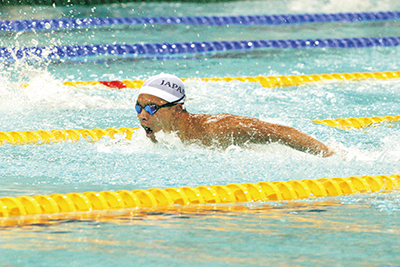 Winning a gold medal at my fourth Paralympic Games, for the third consecutive Games!
Winning a gold medal at my fourth Paralympic Games, for the third consecutive Games!In Japan, too, after Tokyo became a host city for the Olympic and Paralympic Games, moves toward resolving many social issues materialized through the processes of preparing for the Paralympic Games. For example, the Tokyo 2020 Accessibility Guidelines were compiled. At the same time, stadiums, arenas and other venues were designed in line with the standards for competition venues, and those hardware and infrastructure were developed as a legacy. In 2017, we launched the Japanese version of the “I'mPOSSIBLE” education program of the Paralympic Movement in cooperation with the Nippon Foundation Paralympic Support Center. This also provides the opportunity to learn about the creative efforts and change in mindset (as represented by the apostrophe mark) that are interspersed throughout the Paralympics and are needed to transform the “Impossible” elements into “I'mPOSSIBLE.” Furthermore, Paralympic education contents have been included in curriculum guidelines from FY2020, marking the increasing promotion of Paralympic education at schools. In other words, efforts to leave a legacy in people's hearts are advancing steadily.
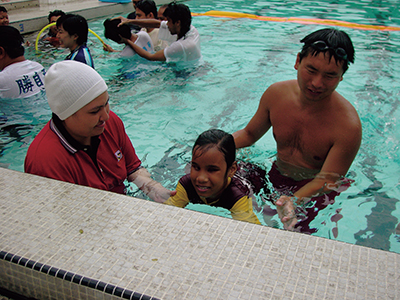 Teaching swimming to children with a visual disability as a member of JICA's Japan Overseas Cooperation Volunteers. Children everywhere in the world have the same aspirations!
Teaching swimming to children with a visual disability as a member of JICA's Japan Overseas Cooperation Volunteers. Children everywhere in the world have the same aspirations!I consider the Paralympic Games to be a “celebration of human potential.” Through the Paralympic Games, we can discover the potential of humans in para athletes' performances that go beyond our imagination, and this in turn gives us the opportunity to become aware of the potential inherent in ourselves. Losing my sight at the age of 15 made me realize that the world I had been able to see until then, or a situation that I had taken for granted, was something which should not be taken for granted. I believe that the Paralympians' way of thinking and way of confronting unjust difficulties can serve as a good reference not only to children, but to people in the world who have lost the “normal” parts of their lives due to the novel coronavirus disease (COVID-19) pandemic.
Therefore, through the Paralympic Games, I hope to send the various discoveries that can transform the “impossible” into the “possible” to the world. I believe that this will be the legacy in people's hearts created through the Paralympic Games Tokyo 2020.
“Exceed, in everyone.”
- *An international contribution through sport initiative implemented by the Government of Japan in cooperation with the public and private sectors.
D Japan's Friendship Ties Programs
Through these programs, the Government of Japan invites and dispatches future leaders with a view to the development of bilateral and region-to-region relationships between Japan and countries/regions in the Asia-Pacific, North America, Europe, Latin America and the Caribbean. Along with promoting a better understanding of Japan's politics, economy, society, culture, history, foreign policy and other elements, the programs produce supporters and experts of Japan. Due to the COVID-19 pandemic, lectures and other programs were held online before and after the invitation and dispatch, enabling the program to continue running even under the conditions of the pandemic. Furthermore, by having program participants actively conveying Japan's foreign policies and charms via social media and other channels, it strengthens external communication and expands Japan's diplomatic infrastructure.
(4) Exchange in the Intellectual Field
A Japanese Studies
The JF comprehensively supports a range of overseas research activities related to the politics, economy, society and culture of Japan. Many Japanese studies researchers overseas visit Japan every year through JF's Japanese Studies Fellowship Programme. However, due to the COVID-19 pandemic in 2020, projects that involve the global movement of people around the world had to be postponed. Given this situation, the JF produced and released a video series that featured foreign Japanese studies researchers who had come to Japan in previous years and continued to stay in Japan under the COVID-19 pandemic, discussing, from the perspectives of their respective expertise, how the Japanese people have responded to COVID-19 and how Japan has changed during the pandemic.
The JF also expanded the collection of books on Japan, dispensed research grants, and provided support for organizing seminars and symposiums, to a total of 39 institutions of Japanese studies in 19 countries and regions. In addition, it provides support to academic societies with the goal of promoting network building among Japanese studies researchers and research institutions around the world.
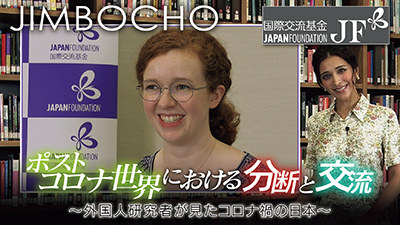 Release of video series discussing Japan during the COVID-19 pandemic, through the eyes of foreign Japanese studies researchers and from the perspective of their respective expertise (Photo: Japan Foundation)
Release of video series discussing Japan during the COVID-19 pandemic, through the eyes of foreign Japanese studies researchers and from the perspective of their respective expertise (Photo: Japan Foundation)B Intellectual Exchanges
MOFA also conducts intellectual exchange programs through the JF. For example, support is provided for seminars and symposiums on common international issues and programs that aim to deepen understanding of modern Japan through lectures and other activities at major universities overseas. Additionally, various projects are also organized or supported such as the program for dispatching Japan-U.S. cultural exchange facilitators and Japanese language education supporters, as well as the exchange projects that strengthen relationships and deepen mutual understanding between people through dialogue in various fields and at various levels with NPOs and other exchange organizations.
C U.S.-Japan Conference on Cultural and Educational Interchange (CULCON)
CULCON is a public-private binational advisory panel comprising experts from Japan and the U.S. that discusses issues on educational and cultural exchange between the two countries. Its subcommittees, the Arts Dialogue Committee and Education Exchange Review Committee, prepared final reports. The report by the Arts Dialogue Committee covered specific activities, such as the nurturing of next-generation art experts and publicity that utilizes networking technology. The report by the Education Exchange Review Committee widely covered specific initiatives undertaken by the public and private sectors of Japan and the U.S. to achieve CULCON's goal of doubling the number of Japan-U.S. exchange students from the target established by the CULCON Education Task Force in 2013, alongside data on the changes in social conditions and trends in the actual number of international students during the review period.
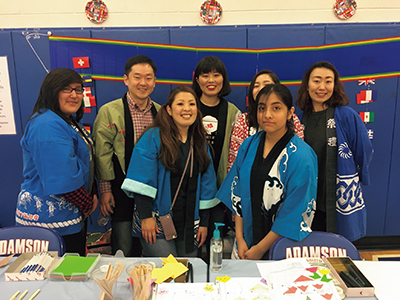 Strengthening Japan-U.S. relations from the grassroots (dispatch program) (March, Texas, U.S.; Photo: The Japan Foundation for Global Partnership)
Strengthening Japan-U.S. relations from the grassroots (dispatch program) (March, Texas, U.S.; Photo: The Japan Foundation for Global Partnership)D Cooperation with the United Nations University (UNU)
The UNU contributes to the international community through study and research on global issues and human resource development. Recognizing the organization's importance, the Government of Japan persuaded the organization to establish its headquarters in Japan in 1975, and since then, has provided support and cooperation for its activities. Through collaboration with Japanese universities and research institutions, the UNU engages in studies on international issues of importance to Japan, including peace, development and the environment, and consequently helps introduce the policies of the Government of Japan to the world. The UNU established Master's and Doctoral programs in 2010 and 2012 respectively, and has made efforts to improve the quality of its global human resource development programs.
(5) Promotion of the Japanese Language
As the globalization of Japan's economy prompts more Japanese companies to do business overseas and Japanese pop culture finds increasing global popularity, interest in learning Japanese is growing around the world, especially among young people. A better understanding of the Japanese language overseas naturally leads to a more favorable international environment for Japanese people and companies. A survey conducted by the JF in FY2018 found that approximately 3.85 million people in 142 countries and regions overseas learn Japanese. In 2019, the Japanese Language Proficiency Test offered by the JF was conducted in 307 cities of 87 countries and regions worldwide, with applicants numbering about 1.37 million, the highest number to date (including those taking the test in Japan). (The test was conducted partially in 2020 due to the COVID-19 pandemic.) However, it is clear that a shortage of Japanese language instructors is a major challenge in the pursuit of satisfying the increasingly diverse interests in and needs concerning Japanese language learning in these many countries and regions.
Through the JF, MOFA works to address the diverse needs related to Japanese language education overseas. For example, MOFA dispatches Japanese language specialists abroad, carries out training programs allowing Japanese language instructors, foreign diplomats and civil servants to learn the language in Japan, conducts preparatory Japanese language pre-arrival training for nurse and care worker candidates based on the Economic Partnership Agreement (EPA) with Indonesia and the Philippines, encourages educational institutions in each country and region to introduce Japanese language education and supports Japanese language educational activities, develops teaching materials, runs e-learning programs, and promotes the “JF Standard for Japanese- Language Education,” which corresponds with international standards for foreign language education.
To address labor force shortages in Japan brought about by aging and depopulation, Japan began accepting foreign workers under the new “Specified Skilled Worker” residence status since April 2019. In line with this effort, MOFA conducts the Japan Foundation Test for Basic Japanese (JFT-Basic), which assesses the Japanese language ability of foreign nationals who come to Japan based on the “Comprehensive Measures for Acceptance and Coexistence of Foreign Nationals” (decided upon at the December 25, 2018, Ministerial Conference on Acceptance and Coexistence of Foreign Nationals). MOFA is also taking new measures that include developing and disseminating learning materials and curriculum with the goal of fostering people's Japanese language ability effectively, as well as nurturing local Japanese language instructors who teach Japanese to those who wish to work in Japan.
(6) Cultural Grant Assistance
To promote culture and higher education in developing countries, and thereby enhance mutual understanding and friendly relations between Japan and these countries, the Government of Japan provides Cultural Grant Assistance as part of the Official Development Assistance (ODA). The assistance implemented in 2020 consisted of three General Cultural Grant Assistance projects (totaling around 561 million Japanese yen) and 16 Grant Assistance for Cultural Grassroots Projects (totaling around 120 million Japanese yen). In 2020, General Cultural Grant Assistance was implemented with an emphasis on the provision of equipment for the preservation and exhibition of cultural heritage and digitalization of a library, while Grant Assistance for Cultural Grassroots Projects centered on cooperation in promoting sports and Japanese language studies.
(7) Cooperation through United Nations Educational, Scientific and Cultural Organization (UNESCO)
Japan is actively involved in a variety of UNESCO projects in the fields of education, science and culture. Since 1951, when UNESCO became the first international organization to which post-war Japan became a member state, UNESCO has been cooperating with Japan on education, science, culture and other fields in developing countries.
In the field of culture, Japan cooperates actively toward the preservation and promotion of the world's tangible and intangible cultural heritage, while providing support in the field of human resource development. Japan also actively participates in the international framework for safeguarding cultural heritage. As part of such activities, Japan supports many projects involving the preservation and restoration of sites such as Angkor in Cambodia and the Kasubi Tombs in Uganda, as well as post-earthquake recovery efforts for Cultural Heritage sites in Nepal. With Japanese experts playing a leading role, Japan also aids human resource development to enable local people to protect such sites by themselves in the future. In particular, since 1994 Japan has provided continuous support for preserving and restoring Angkor in Cambodia. In Afghanistan, since 2003 Japan has also been implementing a project to preserve and restore the Bamiyan ruins, which hold a special place in the heart of the Afghan people. As for the safeguarding of intangible cultural heritage, support is provided to projects to pass on traditional performing arts such as music, dance, and traditional arts and crafts to the next generation in developing countries, as well as projects involving developing domestic institutions and capacity building for relevant parties to enhance countries' ability to protect intangible cultural heritage by themselves.
In the field of social and human sciences, Japan has been contributing to discussions aimed at formulating normative documents at UNESCO concerning ethics of artificial intelligence (AI). For example, Japan and UNESCO co-hosted the Panel Discussion on AI Utilization at TICAD7 held in August 2019, and participated actively in a number of expert meetings that have been held since April 2020.
Japan also supports UNESCO's efforts at strategic transformation toward de-politicization under Director-General Audrey Azoulay. In October, Foreign Minister Motegi visited the UNESCO headquarters in Paris and held a meeting with Director-General Azoulay. He expressed support for her efforts to strengthen UNESCO, including organizational reform. At the meeting, he also conveyed that Japan will continue to contribute actively from the intellectual and personnel aspects in the fields of education, culture, science, and information and communication.
A World Heritage Convention
The World Heritage Convention aims to protect cultural heritage and natural heritage internationally as heritage belonging to all mankind. Japan became a party to the Convention in 1992 (194 parties are in the Convention as of December 2020). The sites listed on the “World Heritage List” are known as “World Heritage Sites.” They are classified into “Cultural Heritage Sites” (monuments and remains), “Natural Heritage Sites” (natural areas) and “Mixed Heritage Sites” (sites with both cultural and natural elements). As of December 2020, a total of 1,121 World Heritage Sites are inscribed on the World Heritage List. Of these, the number of listed sites in Japan now stands at 23: 19 Cultural Heritage Sites and 4 Natural Heritage Sites.
In March 2020, the Government of Japan established the Industrial Heritage Information Centre, which is engaged in activities such as disseminating information on industrial heritage, with a focus on the World Cultural Heritage “Sites of Japan's Meiji Industrial Revolution.”
B Convention for the Safeguarding of the Intangible Cultural Heritage
The Convention for the Safeguarding of the Intangible Cultural Heritage aims to develop an international system for safeguarding intangible cultural heritage such as traditional performing arts and traditional craftsmanship techniques (as of December 2020, the number of parties to the convention is 180). Japan, with wealthy experience in safeguarding domestic intangible cultural properties, has contributed actively to the drafting process of the convention as a leading force, including formulating operational directives for the implementation of the Convention. At the 15th Session of the Intergovernmental Committee for the Safeguarding of the Intangible Cultural Heritage held in December 2020, “Traditional skills, techniques and knowledge for the conservation and transmission of wooden architecture in Japan” was decided to be inscribed on the Representative List of the Intangible Cultural Heritage of Humanity. As a result, a total of 22 elements of intangible cultural heritage in Japan are inscribed on this List.
C UNESCO Memory of the World Programme
The UNESCO Memory of the World Programme was established in 1992 to preserve and promote valuable historical documents. As of December 2020, 427 items have been inscribed.
The fact that the submission and inscription of nominations was done without engagement of member states, despite the possibility of there being clear discrepancies between the views of the concerned member states, is in violation of the founding principle of UNESCO: promoting friendly ties and mutual understanding among member states. Improvements to the review process, while the nomination cycle for new nominations had been stopped, are therefore being advanced. A revised action plan concerning the comprehensive review process was adopted at a meeting of the Executive Board of UNESCO held in October 2018. Although discussions were held over a one-year period, an extension of discussions was decided at the sessions of the Executive Board of UNESCO held in October 2019 and July 2020. Discussions have since been held toward improving the process based on the plan.

